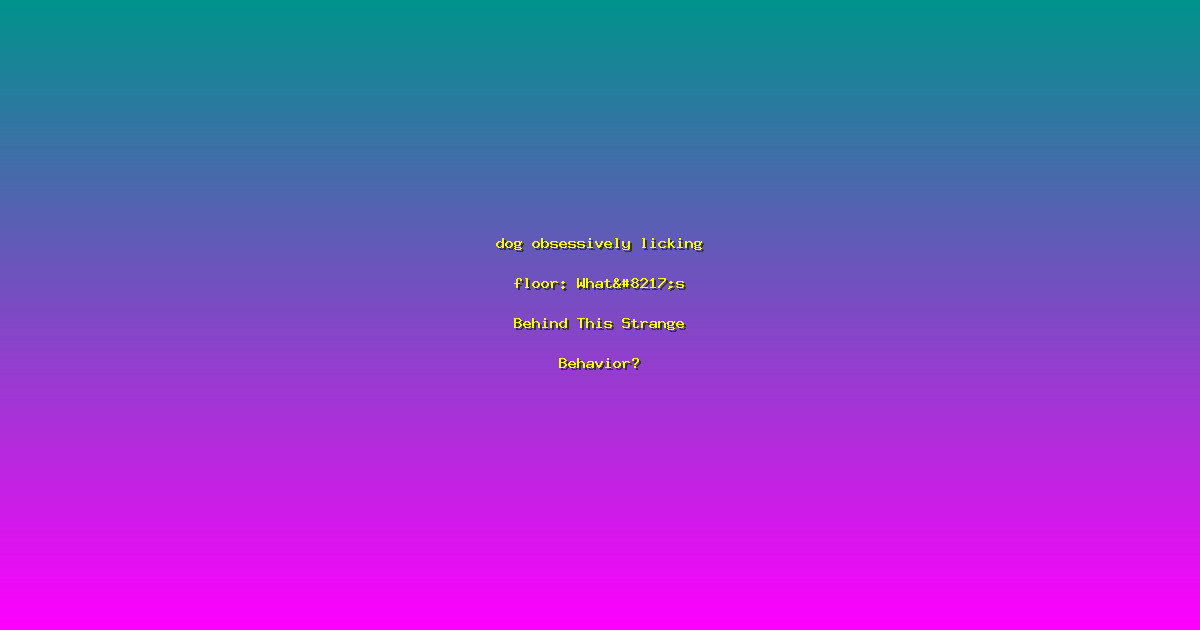dog obsessively licking floor: What’s Behind This Strange Behavior?
Have you ever noticed your furry friend spending an inordinate amount of time licking the floor? This behavior, known as dog obsessively licking floor, can be perplexing and even concerning for pet owners. While it might seem like a harmless habit, it could be a sign of underlying health issues or behavioral problems. In this article, we’ll explore the reasons behind this strange behavior and provide practical solutions to help your dog stop this habit. Understanding the root cause can help you address the issue effectively and ensure your pet’s well-being.
Understanding the Behavior
When a dog obsessively licks the floor, it can be a symptom of various issues, ranging from physical discomfort to psychological distress. One common reason is skin irritation or allergies. Dogs with itchy skin may resort to licking the floor as a way to soothe their discomfort. According to the American Kennel Club, skin allergies affect up to 15% of dogs, making it a prevalent issue among canines. Another reason could be boredom or anxiety. Dogs who are left alone for long periods may develop compulsive behaviors like licking as a coping mechanism.
- Skin Irritation: Dogs with itchy skin often lick the floor to alleviate discomfort. This can be due to allergies, parasites, or other skin conditions.
- Anxiety and Stress: Dogs experiencing anxiety may engage in compulsive behaviors like licking the floor as a way to self-soothe.
- Medical Conditions: Certain medical conditions, such as gastrointestinal issues or neurological disorders, can also lead to this behavior.
Identifying the Cause
To address the issue of dog obsessively licking floor, it’s crucial to identify the underlying cause. A visit to the veterinarian is often the first step. They can perform a thorough examination to rule out any medical conditions that might be causing the behavior. For instance, if your dog has a skin allergy, your vet might prescribe medication or recommend a change in diet to alleviate the symptoms. Additionally, observing your dog’s behavior can provide clues. If the licking occurs more frequently when your dog is alone, it could be a sign of separation anxiety.
- Veterinary Examination: A vet can diagnose any underlying medical conditions that might be causing the behavior.
- Behavioral Observation: Pay attention to when and where your dog licks the floor to identify potential triggers.
- Environmental Factors: Consider changes in your dog’s environment that might be contributing to the behavior.
Addressing the Issue
Once you’ve identified the cause of your dog’s obsessive licking, you can take steps to address it. If the behavior is due to skin irritation, your vet might recommend a medicated shampoo or a change in diet to reduce allergens. For anxiety-related licking, providing mental stimulation and reducing stress can help. Engaging your dog in regular exercise and playtime can alleviate boredom and anxiety. Additionally, using calming aids like pheromone diffusers or anxiety wraps can be beneficial.
- Medical Treatment: Follow your vet’s recommendations for treating any medical conditions contributing to the behavior.
- Behavioral Modification: Use positive reinforcement training to discourage the licking behavior and encourage alternative activities.
- Environmental Changes: Create a more stimulating environment to reduce boredom and anxiety.
Frequently Asked Questions
Is obsessive licking harmful to my dog?
Yes, obsessive licking can be harmful. It can lead to skin irritation, infections, and even behavioral issues if left untreated. It’s important to address the behavior as soon as possible to prevent further complications.
Can diet changes help reduce licking?
Yes, dietary changes can help. Many dogs suffer from food allergies or sensitivities that can cause skin irritation and lead to obsessive licking. Switching to a hypoallergenic diet or eliminating certain ingredients can often alleviate the symptoms.
How can I distract my dog from licking?
Providing alternative activities can be effective. Engage your dog in regular exercise, playtime, and mental stimulation activities like puzzle toys. This can help reduce the urge to lick the floor.
What if my dog continues to lick despite treatment?
If the behavior persists despite treatment, it’s important to revisit your vet. There might be an underlying condition that hasn’t been fully addressed. Your vet can provide further guidance and alternative treatments.
Are there any natural remedies to stop licking?
Yes, natural remedies can be helpful. Essential oils like lavender or chamomile can have a calming effect on dogs. However, always consult your vet before using any natural remedies to ensure they are safe for your pet.
Conclusion
Understanding why your dog is obsessively licking floor is the first step in addressing this behavior. By identifying the underlying cause, whether it’s a medical condition, anxiety, or environmental factors, you can take the necessary steps to help your furry friend. Whether it’s a visit to the vet, changes in diet, or increased mental stimulation, there are practical solutions to stop this behavior. By taking action, you can ensure your dog’s comfort and well-being, leading to a happier and healthier pet. If you’re concerned about your dog’s behavior, don’t hesitate to seek professional advice and take the necessary steps to address the issue.
